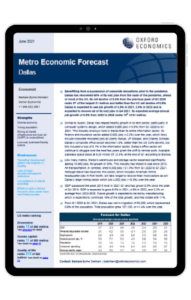US | Metro Economic Forecast: Dallas

Benefitting from a succession of corporate relocations prior to the pandemic, Dallas has recovered 68% of its lost jobs from the nadir of the pandemic, ahead of most of the US. Its net decline of 3.0% from the previous peak of Q1 2020 ranks 9th of the largest 51 metros and better than the US net decline of 5.6%. Dallas is expected to see job growth of 3.8% in 2021, 2.9% in 2022 and is expected to recover all of its lost jobs in Q4 2021. Its expected average annual job growth of 0.9% from 2023 to 2025 ranks 14th of 51 metros.
What you will learn:
- Similar to Austin, Dallas has reaped healthy growth in its tech sector, particularly in computer systems design, which added 9,000 jobs (+9.8%) from Q1 2020 to Q1 2021.
- Like many metros, Dallas’s warehouse and storage sector expanded significantly adding 15,800 jobs, for growth of 30%. This industry has tripled in size since 2015. Air transportation, in contrast, shed 8,500 jobs (-21.3%) from Q1 2020 to Q1 2021.
- GDP surpassed the peak 2019 level in 2021 Q1 and has grown 0.9% since the peak of Q4 2019. GDP is expected to grow 8.5% in 2021, 4.9% in 2022, and 2.2% on average from 2023-2025.
Tags:
Related Services

Post
Food prices to bottom out in 2024, risks skewed to upside
Our baseline forecast is for world food commodity prices to register an annual decline this year, in aggregate, reducing pressure on food retail prices further downstream. However, we believe the risks to this forecast are overwhelmingly skewed to the upside.
Find Out More
Post
Battery raw material prices to recover
Battery raw materials prices bottomed out last quarter and we think a sustained recovery is looming. Midstream EV battery manufacturing activity has picked up again and inventories have returned to historical levels, suggesting upstream demand for raw materials will also bounce back.
Find Out More